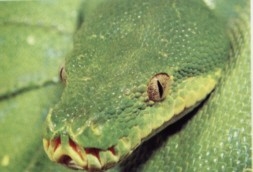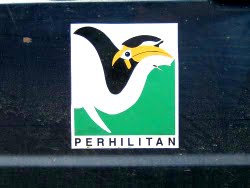Buy Green Tree Python
Scientific Name: Morelia viridis

Proudly Sponsored by
Robert Webster, Armidale, NSW
Stuart Hawkes, Sydney
Did You Know?
The end of the tail of the green tree python is a different colour from the rest of the snake and is used as a lure to attract potential food. It is held in front of the snake's head and wriggled to resemble a writhing worm.
An unmistakable arboreal or tree-dwelling python, the adult green tree python is emerald green in colour with a yellowish belly. Occasional specimens also have small white markings along the back. Hatchlings on the other hand, are quite different, emerging from the egg a bright sulphur yellow or sometimes reddish-orange, changing into the adult colouration after 1-2 years. Green pythons are relatively short, stout-bodied snakes rarely exceeding 1.5-1.8m in length. Like all pythons they are non-venomous bat are armed with an impressive set of long recurved teeth to enable them to maintain a grip on their struggling prey amongst the branches.
Habitat:
In Australia the species is restricted to the rainforests of eastern Cape York Peninsula in far north Queensland. It is also widely distributed in Papua New Guinea and Irian Jaya.
Diet:
Most of the diet comprises small mammals and birds. Ground-dwelling rodents are a favourite prey, the snakes lying in wait on a branch a metre or so from the ground grabbing the unsuspecting animals as they pass below. Juvenile snakes feed mostly on small lizards and frogs.
Reproduction:
Female green tree pythons locate a suitable tree hollow in which to lay their clutch of 8-25 eggs. Once produced, she will wrap herself around them to maintain the correct incubation temperature until they hatch around 6-8 weeks later.







 Malacca Zoo is a 54-acre (22 ha) zoological park located besides Lebuh Ayer Keroh (Federal Route ) in the town of Ayer Keroh in the state of Malacca, Malaysia. More than 1200 animals of 215 species can be found at the Malacca Zoo. It is the second-largest zoo in Malaysia behind the National Zoo of Malaysia (Zoo Negara). In 2007, along with the...
Malacca Zoo is a 54-acre (22 ha) zoological park located besides Lebuh Ayer Keroh (Federal Route ) in the town of Ayer Keroh in the state of Malacca, Malaysia. More than 1200 animals of 215 species can be found at the Malacca Zoo. It is the second-largest zoo in Malaysia behind the National Zoo of Malaysia (Zoo Negara). In 2007, along with the...